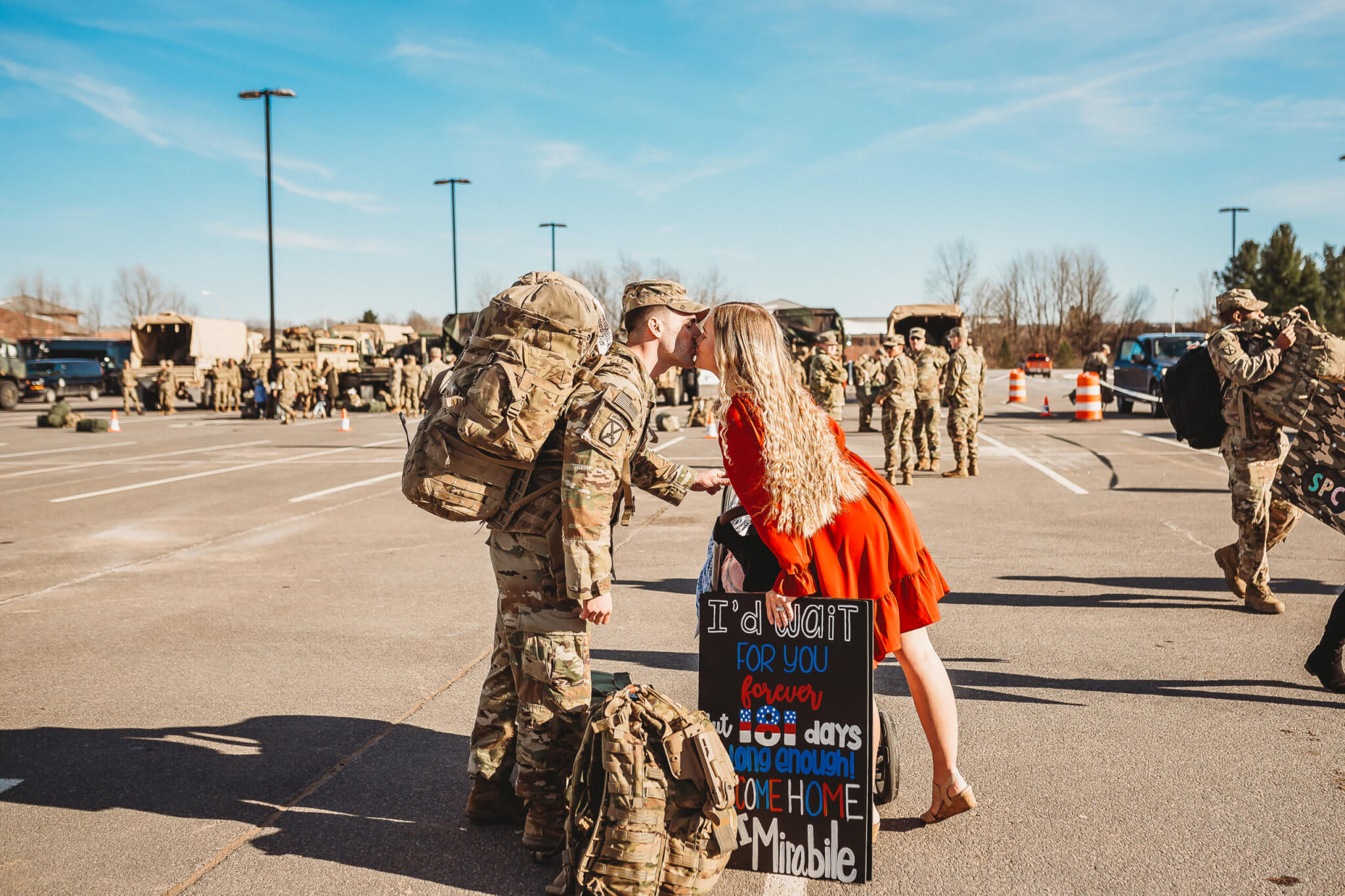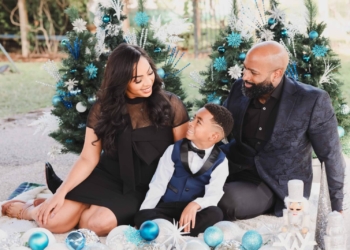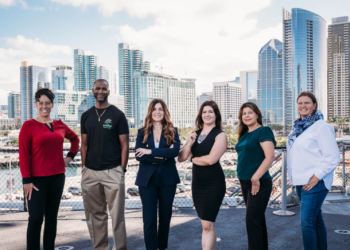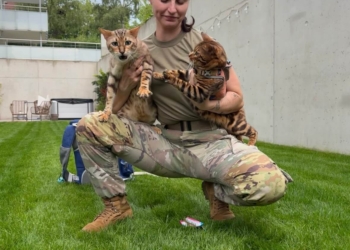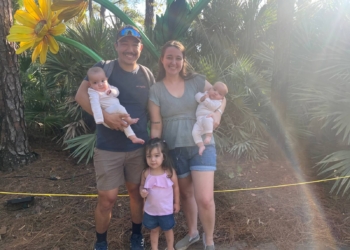Army Capt. Paul Mirabile’s newborn daughter, Sallie, was only one month old when the soldier deployed to Northern Syria. His wife, Emily, says it was a “whirlwind.”
“To be a first-time mom entering the world of motherhood, and my husband’s going to a combat zone … it was a whirlwind,” Emily Mirabile told Military Families Magazine from her home at Fort Drum, New York.
And that whirlwind has defined much of their military romance. The couple met while Paul was home on leave in Maryland. By June 2020, Emily had graduated college, they were married and rode out the COVID-19 pandemic at their first duty station in Schofield Barracks, Hawaii. They PCSed to Fort Drum, New York, two years later, where Paul knew a deployment was imminent but unit support ahead of his departure helped him feel at ease.
“The SFRG [Soldier and Family Readiness Group] is still a big thing. … and [my units] brought everybody in and were like, ‘hey, this is who’s-who,’” Paul said. “They had really good deployment fairs, so it left me comfortable handing the torch off and leaving her behind with a four-week-old baby, knowing that if she needed something — or somebody — she could reference it.”
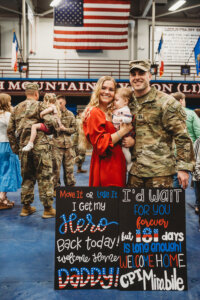 Emily, who grew up in a military family, agreed.
Emily, who grew up in a military family, agreed.
“The support at Fort Drum is unlike anything else, talk about a closeknit family. That’s one thing I definitely love about the military life, too,” she explained. “Growing up I saw my parents going through that and just the support, and the connections that they’ve made; you make lifelong friends.”
She added that the support extended from the battalion commander and his wife “meant everything,” with the unit hosting monthly coffee socials and gatherings at the spouses’ homes for morale.
But when tougher moments came, Emily says it was their daughter who gave her the strength to get through the day.
“I am so blessed to have her. Everyday looking at her, if I’m having a hard moment, I would give her a big old kiss on her little chubby cheeks and I felt like everything would be OK,” Emily said. “She gave me all the purpose I needed.”
Paul says being a new father is what guided him through his own hard times.
“I would say the hardest part for me was leaving … because it was a lot of first things — we hadn’t even figure out the whole parenting thing, but I would argue that’s what made the harder days better: a sense of purpose; for me, fatherhood and for her, motherhood,” Paul said. “You have someone’s childhood in your hands, so you do what you have to do.”
Emily also said her extended family’s support helped, often leaning on her parents’ advice from their military experiences. Her mom, for example, encouraged Emily to avoid watching the news while Paul was gone.
Paul suggests couples lay groundwork for what communication will look like in advance of a deployment. He and Emily agreed they would avoid real-time updates of what was happening on the ground in Syria to keep her insulated from additional stress and worry. Instead, they used their talks to catch up on lighter subjects.
They kept in touch using Facetime and video chat, while Emily documented Sallie’s milestones — from favorite toys to books, and just her changing life, knowing Paul “was going to come back to a baby he didn’t even know.”
“I can only imagine how hard it was for him watching his daughter grow through pictures and videos,” she said.
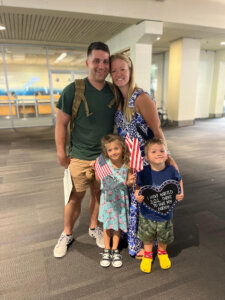
Life on their own terms
Celebrating key dates is exactly what Rebecca Wenger set out to do, with a little help from the local community. Rebecca, whose husband Aaron served 10 years with the Pennsylvania National Guard, planned a consolidation of holidays ahead of the couple’s 10-month deployment.
“Before he left, my oldest daughter said, ‘daddy isn’t going to be here for trick-or-treating’ … so all the neighbors had a group chat to host Halloween early. Then my mother-in-law found a turkey so we could do Thanksgiving, and they setup a fake Christmas tree; our neighbor dressed as Santa, and we had gifts for the kids,” she said from their home at Fort Liberty, North Carolina.
Rebecca explained the events helped her husband say goodbye to the people in their lives. They also did an Easter egg hunt, celebrating the kids’ birthdays, and got sparklers for an early Fourth of July. She then took photos from each of the holiday gatherings to build a calendar that showcased dad as part of the memory.
“What helped the most was having that memory to draw back on because then when we went through the holidays, it was definitely, hard but we did have those memories to pull back on for the kids who were struggling,” Rebecca said of her children, now ages 6 and 5 years old. “My focus was more to help the kids but that helped my mindset, too.”
The beginning of the deployment was a tough adjustment, she added, but they used a Facebook portal to send messages back and forth. Aaron also recorded bedtime stories and goodnight messages on a Storypod.
One of the most challenging parts of the separation was the kids’ understanding of time, because “for them a week feels like a year.” And homecoming dates kept changing, leading Rebecca to have to add links back to a paper chain the kids were counting down with.
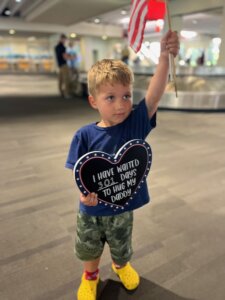 Aaron returned home last summer to banners, streamers, signs and neighbors lining their cul-de-sac. Because he decided to apply for a JAG position with the active Army, the family’s reintegration period was stacked with a house hunting trip and preparing for their first PCS move.
Aaron returned home last summer to banners, streamers, signs and neighbors lining their cul-de-sac. Because he decided to apply for a JAG position with the active Army, the family’s reintegration period was stacked with a house hunting trip and preparing for their first PCS move.
“We went through the honeymoon period of excitement and then it’s real life. … Figuring out the balance between the routine we had and the one incorporating him into a new routine,” Rebecca said. “We had to figure out a groove pretty quickly to be able to manage all of the other stuff.”
They also surprised the kids with a family Disney cruise.
In the end, Rebecca credits her faith with pulling her through a season of firsts.
“One thing that has always been grounding to me is my faith in God and really relying on that; that’s the only thing that was constant between moving away from family and friends. And then also relying on our community for support when we were back in Pennsylvania. … relying on support, sometimes we struggle with asking for help. You can’t do it yourself; you do need that support system,” she said.
Paul, too, says faith is vital; “faith in each other.”
“Have some grace and empathy and understand there was a big chunk of time that we had our own experiences; have faith in each other. You made it through the deployment, you will make it through integration,” Paul concluded.


